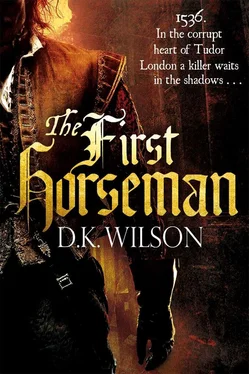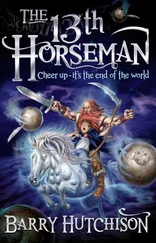D. Wilson - The First Horseman
Здесь есть возможность читать онлайн «D. Wilson - The First Horseman» весь текст электронной книги совершенно бесплатно (целиком полную версию без сокращений). В некоторых случаях можно слушать аудио, скачать через торрент в формате fb2 и присутствует краткое содержание. Год выпуска: 2013, ISBN: 2013, Издательство: Little, Brown Book Group, Жанр: Исторический детектив, на английском языке. Описание произведения, (предисловие) а так же отзывы посетителей доступны на портале библиотеки ЛибКат.
- Название:The First Horseman
- Автор:
- Издательство:Little, Brown Book Group
- Жанр:
- Год:2013
- ISBN:9781405518871
- Рейтинг книги:5 / 5. Голосов: 1
-
Избранное:Добавить в избранное
- Отзывы:
-
Ваша оценка:
- 100
- 1
- 2
- 3
- 4
- 5
The First Horseman: краткое содержание, описание и аннотация
Предлагаем к чтению аннотацию, описание, краткое содержание или предисловие (зависит от того, что написал сам автор книги «The First Horseman»). Если вы не нашли необходимую информацию о книге — напишите в комментариях, мы постараемся отыскать её.
The First Horseman — читать онлайн бесплатно полную книгу (весь текст) целиком
Ниже представлен текст книги, разбитый по страницам. Система сохранения места последней прочитанной страницы, позволяет с удобством читать онлайн бесплатно книгу «The First Horseman», без необходимости каждый раз заново искать на чём Вы остановились. Поставьте закладку, и сможете в любой момент перейти на страницу, на которой закончили чтение.
Интервал:
Закладка:
There was a murmur of acquiescence.
‘Very well, outside, all of you. Master Treviot, I will hear you first.’
When the other witnesses had shuffled through the doorway and closed it behind them, Kernish looked up at me. ‘For the record,’ he demanded, ‘you must state your name and occupation.’
When that had been done and noted by the secretary’s scratching pen, the lawyer launched his routine interrogation. ‘Our first responsibility is to establish the identity of the deceased. I understand he was known to you. Is that so?’
‘He was Robert Packington, mercer, leading citizen of London, member of the Common Council and of the parliament. He was also one of the finest men who graced the life of this city. I have known him all my life and was privileged to call him my friend. Master Kernish, the sooner we can complete the formalities and set about tracing — ’
The coroner held up a hand. ‘I repeat what I said just now: relevant facts are all I require at this stage. Rest assured that accumulating evidence is the best way of discovering whether a crime has been committed and, if it has, of bringing the perpetrator to justice.’ He sat back in the chair and his tone changed. ‘So it is Master Packington whose body lies below.’ He crossed himself. ‘That is a severe loss indeed. One which many of us share. He was one of this city’s finest sons. I met him on many occasions and know something of his charitable works. There are many who have cause to thank God for Master Packington. It is hard to think that anyone would wish him ill. Mayhap your physician will find some natural cause — ’
‘He was struck down,’ I blurted out. ‘There was blood all over-’
Again Kernish motioned me to silence. ‘We must have everything in order. Now, Master Treviot, tell me clearly what you saw.’
I shook my head in exasperation. ‘I saw nothing. Would to God I had been there moments earlier. I might have — ’
‘Facts, Master Treviot. Facts, facts, facts!’
I explained that Robert and I had an arrangement to meet at the Mercers’ Chapel, that I had come across a group of men close by the conduit and found them gathered round Robert’s body.
‘How was the body lying?’ Kernish asked.
‘He was on his back, feet towards the conduit. His cloak had fallen open and there was blood on his doublet.’
‘Was there a weapon of any kind on the ground?’
‘Not that I saw.’
‘And none of the bystanders was holding a sword, knife or poignard?’
‘I… don’t know… but I can’t imagine…’
‘We’ll have no imagining, if you don’t mind.’
‘Sorry. It’s just that if one of those men had struck my friend down, the others must have seen.’
‘Unless they were all complicit.’
‘You mean they might all have been waiting for him in ambush?’
‘At this stage I must rule nothing out. Were there others abroad at that hour? Did you see anyone running or walking from the scene?’
‘The Cheap is very quiet at night’s end and it was dark. Yet, I am sure I would have noticed anyone hurrying away. There was a fellow there — a tanner — who claims that Master Packington was accosted by a foreigner in a hooded cloak who made off down Bucklersbury, but I saw nothing.’
‘A foreigner, eh? A convenient tale. Strike down your victim and lay the blame on some stranger. Well, we shall see what your tanner has to say for himself. Daniel’ — he turned to his secretary — ‘bring the fellow in. Master Treviot, you may stay, if you wish.’
When obliged to appear before authority the voluble leatherworker seemed to have lost his tongue. He stood in the middle of the room nervously twisting his cap in his hands. He gave his name as Dick Fennel.
Though nervous and rendered even more so by Kernish’s brusque manner, the tanner stuck to his story. He explained that he had taken his place by the conduit, as he did most mornings, in the hope of acquiring casual work. He had seen Robert approach, at which point a hooded figure, who apparently managed to be both ‘a foreigner’ and ‘Satan’, had pointed at him, called out something, then discharged ‘a bolt from hell’, whereupon Master Packington had fallen back dead.
The coroner was distinctly unimpressed.
‘At this rate,’ he groaned, ‘we shall be here all day and no further forward.’ He glowered at the cringing tanner. ‘Put your mark to this statement. Then get out and send in the next witness. Pray God he is not as witless as you.’
Fennel scrawled on the paper where the secretary indicated and gratefully shuffled from the room.
What we learned from the next two witnesses took us no nearer to identifying the assassin or, indeed, to understanding the exact nature of the assassination. There seemed to be agreement that a cloaked and hooded figure had pointed at Robert, at the same time calling something out. One of the apprentices, a wide-awake looking young man with untidy fair hair, who gave his name as Benjamin Walling, provided the clearest and most succinct evidence, though it scarcely made sense. It was his firm opinion that the murderer had demanded — though with a thick and possibly foreign accent — ‘Who’s there?’ and that Robert had replied, ‘Thomas.’
I was still trying to make sense of that when the door burst open and Dr Drudgeon strode in. Harry Drudgeon, whom I had known all my life, was our family physician and I had had no hesitation in sending for him to examine Robert’s body. He entered now, rubbing his hands on a red-stained apron. Always a fastidious man, he had been careful to cover his grey satin doublet but there was a streak of blood across one cheek and on his neatly trimmed beard. I had no need to introduce him to the coroner; most of the City’s leading professionals were known to each other and I imagined that Harry was well accustomed to giving evidence at inquests.
‘Welcome, Doctor,’ Kernish said, waving the newcomer to a chair. ‘Doubly welcome if you can provide us with any more substantial evidence about this sad affair. So far we have only heard from witnesses who talk of a hooded man, shouting unintelligibly and somehow stabbing his victim at several paces without leaving any trace of his weapon behind.’
‘No mystery there, Master Kernish.’ He opened his hand and allowed a small metal pellet to roll on to the table. ‘There’s your weapon.’
Chapter 11
We all stared at the tiny object. I expressed our bewilderment. ‘That looks like… shot, arquebus shot.’
Harry nodded, ‘It is arquebus shot.’
‘But that is not possible.’ I pictured the weapons I had sometimes seen the militia practising with on Finsbury Field or stored in their racks in Leaden Hall. Four or five feet in length, they were quite unwieldy.
Kernish agreed. ‘The assassin could not have discharged a firearm without being noticed. Even if no one saw the flame applied to the smouldering match, the flash and the explosion as the powder ignited must have been clearly visible from yards away.’ The lawyer seemed personally affronted by facts that refused to fit together.
Drudgeon shrugged. ‘My job is to decide the cause of Master Packington’s death, not to explain the circumstances surrounding it. I was a surgeon with the King’s army in ’thirteen and I know a gunshot wound when I see one. I removed that ball from Master Packington’s heart and I will stake my career on the fact that he was shot with a firearm.’
We were all struck dumb. I wager the others were thinking the same as me: This sort of thing did not happen in London… or England. In Italy, possibly, or the wilder parts of Germany, but London?
‘Perhaps Fennel was right,’ I muttered. ‘All that talk about a hooded foreigner.’
Читать дальшеИнтервал:
Закладка:
Похожие книги на «The First Horseman»
Представляем Вашему вниманию похожие книги на «The First Horseman» списком для выбора. Мы отобрали схожую по названию и смыслу литературу в надежде предоставить читателям больше вариантов отыскать новые, интересные, ещё непрочитанные произведения.
Обсуждение, отзывы о книге «The First Horseman» и просто собственные мнения читателей. Оставьте ваши комментарии, напишите, что Вы думаете о произведении, его смысле или главных героях. Укажите что конкретно понравилось, а что нет, и почему Вы так считаете.












